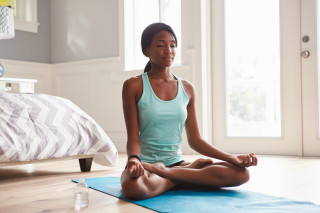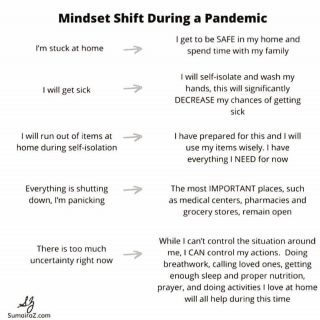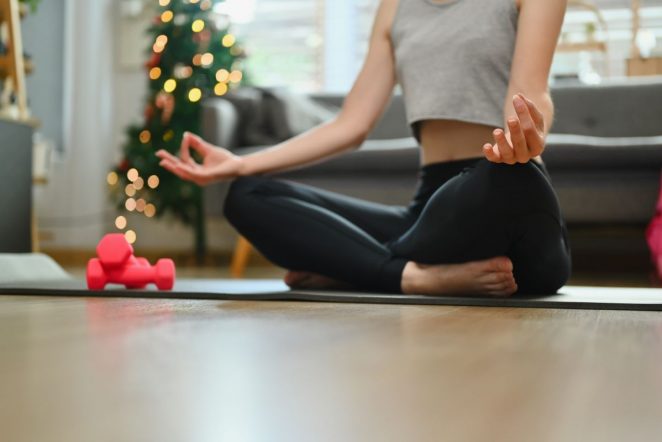There is no doubt that everyone in the state of Michigan is living in crisis mode with the outbreak of COVID-19; schools and businesses closed, social distancing and so (so) much time at home. It’s a stressful time. In fact, 36% of Americans say that the pandemic has had a serious impact on their mental health according to the American Psychiatric Association. The good news is there are ways to cope with stress that can make you, the people you care about and your community stronger.
- Set a schedule. With families working and school happening at home, it can be easy to let the day slip away without taking breaks for meals, exercise, and yes, even some fun. If you don’t stick to a schedule, burnout will leave you feeling emotionally exhausted. Your schedule may need to be more flexible than your norm if you have kids at home that need care or education, and that’s ok. Lean on school resources and family/friends to help. Don’t have kids? That doesn’t mean you should work or study 24/7. Take time for lunch breaks, shut down your devices at the end of the work or school day, and keep your weekends or days off for resting and recharging. Work/life balance is always important—now more than ever.
- Take media breaks. COVID-19 is all over the news, our social media feeds and pretty much everywhere you look. While it’s important to stay informed, the Centers for Disease Control and Prevention (CDC) recommends taking frequent breaks from news stories and social media during this time. Maybe it’s for 20 minutes a few times a day and after 9 p.m. at night so you can rest peacefully. You can always check back in in the morning. Or, try setting media check-ins at set times per day. Whatever is comfortable for you is a schedule you should also stick to so you can give your brain a break.
- Still socialize. It’s important to stay connected to others outside of your home. And it’s normal to want to connect with others other than those you are sheltering in place with – there is such a thing as too much quality time. Just because you can’t physically get together in groups doesn’t mean you need to cancel playdates, happy hours, birthday celebrations or meals. Since human beings are social creatures at our core, isolation can lead to depression or increase your anxiety.
 Set up a video chat to connect one on one or in groups small to large using the many tech tools available like Zoom, Facebook messenger, FaceTime, Google Hangouts, Skype and others. Feeling isolated while you work from home? Turn on that video during virtual meetings, schedule video chat lunches or team happy hours. And by all means, just pick up the phone and call a friend or loved one—better yet, give your grandparents or other older relatives a call. With so much typing and texting while working or studying remotely, good old-fashioned phone calls to hear others’ voices can lift your mood instantly.
Set up a video chat to connect one on one or in groups small to large using the many tech tools available like Zoom, Facebook messenger, FaceTime, Google Hangouts, Skype and others. Feeling isolated while you work from home? Turn on that video during virtual meetings, schedule video chat lunches or team happy hours. And by all means, just pick up the phone and call a friend or loved one—better yet, give your grandparents or other older relatives a call. With so much typing and texting while working or studying remotely, good old-fashioned phone calls to hear others’ voices can lift your mood instantly. - Sweat it out. No question, exercising impacts physical health and is recommended during this pandemic to keep your body healthy, boost your energy and lift your mood. In fact, many studies have shown a positive link between exercise and a reduced prevalence of depression. Get everyone in your house involved in a quick workout if you’re feeling moods dip. Here are five home workouts our health coach Kris recommends. And for the kids? P.E. class at home is possible with so many YouTube videos out there and gonoodle.com offers movement and mindfulness videos created by child development experts for free.
- Get outdoors. With so much time inside, getting outside daily should be on your schedule. A walk around the block with a friend (six feet of distance of course), a hike at a nearby park or simply tossing a ball to your dog in the backyard can instantly boost your mood. As the weather begins to warm up in Michigan, the sunshine on your face will feel so good. Here are some ideas to get out and moving this spring.
- Make time for mindfulness. This is something you should do alone to calm your mind and put your anxiety at ease.
 Meditation can be a great solution for letting go of daily stress, frustration or anxiety. Mental and emotional stress can affect how you feel physically. Often when people are stressed, they feel tired, irritable and are more prone to sickness. By meditating and calming your mind, you are also calming your body. Mindful breathing is one of the easiest ways to practice meditation. A meditation app such as Headspace may be a helpful tool to get you started.
Meditation can be a great solution for letting go of daily stress, frustration or anxiety. Mental and emotional stress can affect how you feel physically. Often when people are stressed, they feel tired, irritable and are more prone to sickness. By meditating and calming your mind, you are also calming your body. Mindful breathing is one of the easiest ways to practice meditation. A meditation app such as Headspace may be a helpful tool to get you started. - Give gratefulness a try.
 Writing in a journal every day helps you keep track of your thoughts, events and emotions. Journaling is a simple concept; just write whatever comes to mind. During this time, with so many negative updates in the media, experts recommend writing down at least one thing you are grateful for each day. Maybe it’s that the sun is shining or that you have everything you need for food and supplies, or that you have never enjoyed your pets or kids so much. If free-hand journaling seems overwhelming, try the five minute journal, available in both paper and electronic formats. The five-minute journal is based on positive psychology research and offers morning and evening prompts to help improve happiness and overall wellbeing.
Writing in a journal every day helps you keep track of your thoughts, events and emotions. Journaling is a simple concept; just write whatever comes to mind. During this time, with so many negative updates in the media, experts recommend writing down at least one thing you are grateful for each day. Maybe it’s that the sun is shining or that you have everything you need for food and supplies, or that you have never enjoyed your pets or kids so much. If free-hand journaling seems overwhelming, try the five minute journal, available in both paper and electronic formats. The five-minute journal is based on positive psychology research and offers morning and evening prompts to help improve happiness and overall wellbeing. - Reframe your thinking. This is a helpful chart to use during this time to shift your mindset from negative to positive.
 You can also check out our health coach Angie’s tips for positive thinking here.
You can also check out our health coach Angie’s tips for positive thinking here. - Focus on fun. This is a scary, stressful time but you—and especially kids—still need to have a little fun each day. Maybe it’s an impromptu dance party, Taco Tuesday, movie night, family game night or yard games, or a virtual video play date. Fun can be individual too, like learning a new instrument, downloading an adult coloring app or dusting off those old video games. Check out these home entertainment ideas.
 Ask for help. If it’s all getting to be too much, it may be time to get some professional help. And that’s ok. Professional training makes behavioral health counselors a valuable resource if you’ve suffered a trauma, have a mental illness or are simply striving for improved mental wellbeing. Therapists can specialize in many different areas including children, families, relationships and grieving. These health care professionals listen to you and offer tools to help you solve any identified problems.
Ask for help. If it’s all getting to be too much, it may be time to get some professional help. And that’s ok. Professional training makes behavioral health counselors a valuable resource if you’ve suffered a trauma, have a mental illness or are simply striving for improved mental wellbeing. Therapists can specialize in many different areas including children, families, relationships and grieving. These health care professionals listen to you and offer tools to help you solve any identified problems.
Not sure if it’s time for help? Watch out for these seven signs.
Behavioral help resources
Here are some options if you’ve decided you could use some help:
- Your health insurance company. Check with your health plan to see which resources are available. For example, Priority Health provides members with information like what kind of help is available, what your plan will cover and how to find counselors or behavioral health care providers to meet your needs. An on-staff behavioral health team is available to help 24 hours a day, seven days a week. Call the number on the back of your member ID card (your call is completely confidential) or log into your online account. Priority Health has also partnered with a digital health specialist to offer free access to mental wellness resources specifically focused on the COVID-19 pandemic. Learn more here. And if you’re a Priority Health member, $0 cost share for behavioral health virtual visits are being offered to members through December 31, 2020. Learn more here.
- Disaster distress helpline. A 24/7, 365-day-a-year, national hotline dedicated to providing immediate crisis counseling for people who are experiencing emotional distress related to any natural or human-caused disaster. This multilingual, and confidential crisis support service is available to all residents in the United States and its territories. Call 1-800-985-5990 or text TalkWithUs to 66746 to connect with a trained crisis counselor.
- Online or virtual care. Try an online therapy session through a website such as 7 Cups, an online emotional health service provider. The app enables users to select listeners based on their preferences/experiences and anonymously chat via the platform 24/7. In times of emotional turmoil or stress, it is highly beneficial to talk to someone and this app offers a safe space to do that. Headspace is another free mental health resource for Michiganders during the COVID-19 pandemic offering meditations, at-home workouts and other help for stress and anxiety.
- Community resources. For Michiganders in need of free or low-cost mental health, the Michigan Department of Health and Human Services has a county map of community mental health service programs.
Whatever tools you use for help, take the time to make your mental health a priority during this season of stress and uncertainty. Your mind and health are worth it.


